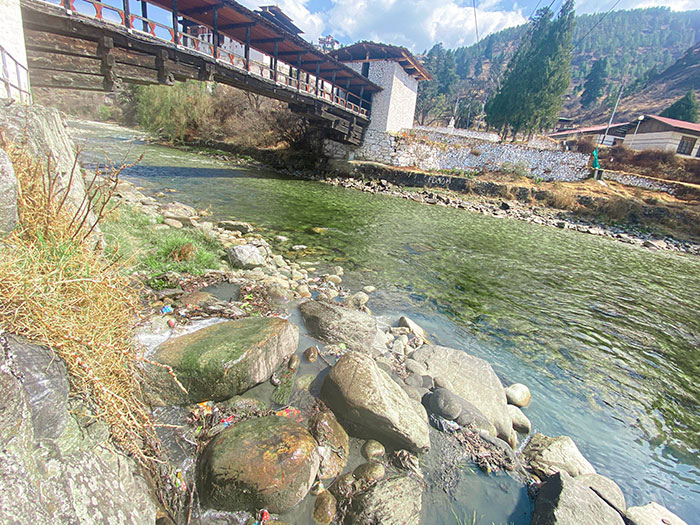
Grey water flows directly into Pachhu near Nyemizampa
Phub Dem | Paro
Commuters walking to Paro dzong via Nyemizampa and residents near the bridge have been troubled by the pungent odour of waste flowing into the river.
A 40-year old man, on his way to the dzong for some official work, said he was worried about the waste and the odour.
Grey water and solid waste from Tshongdue town is dumped straight into the Pachhu near Nyemizampa through the storm water drain.
A resident near Nyemizampa, Karma, said it was an eyesore for those visiting the dzong.
He said that the wooden bridge over the Pachhu was a tourist attraction.
Although Paro is growing rapidly, the dzongkhag doesn’t have a treatment plant.
In 2017, Bhutan Water Partnership carried out an assessment on effluent discharge and management systems of the automobile workshops in Paro town and found that with better facilities, effluent discharge from the automobile workshops were fairly low, and pollution was reported from downstream of automobiles.
However, it was found that none of the workshops had effluent treatment plants, oil interceptor or oil-water separators.
The report recommended the dzongkhag and workshop owners to explore the possibility of installing the facilities.
The dzongkhag’s chief environment officer, Ngawang Dorji, said workshops had essential sedimentation tanks to collect oil from service points. “As the automobile workshops had to relocate, except for an effluent treatment plant at Bondey, others don’t have the facilities.”
He said that the dzongkhag is currently looking for an ideal location for a mini-industrial estate to relocate the workshops. “When all workshops are located in one place, we’ll have a treatment plant.”
According to the municipal engineer, Ugyen Eden, the construction of the sewage treatment plant and sewer network was included in the 12th plan of the dzongkhag.
She said wastewater flowed into the rivers directly today, as there was no treatment plant. “Considering the health and environmental risk of untreated wastewater, we proposed treatment plant construction in the next financial year.”
Ugyen Eden said although the treatment plant construction was proposed years ago, finding an ideal location and getting clearances from the community had impeded work progress. “We’re proposing a confined treatment plant like that in Taba Thimphu. We’re hopeful this time.”
She said that, while those residing in the municipality proposed having a sewer network, the settlement came before the plan.
She also said that, although having a sewer network was the best, dzongkhag prioritised treatment plants as it has become a necessity for now. “The treatment plant can be upgraded if the sewer network comes through.”

